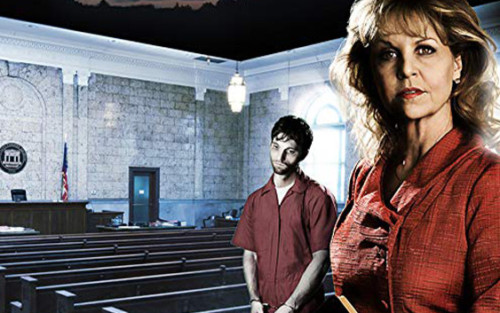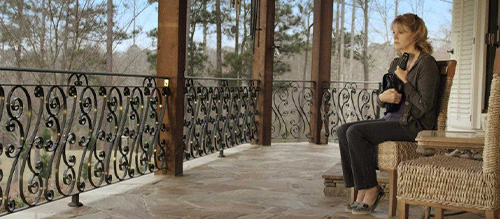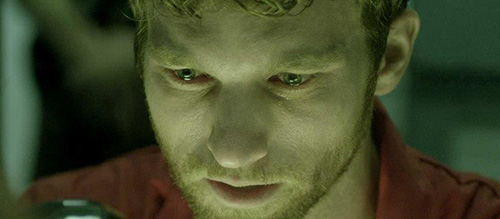A Textual Critique of ‘Stand Your Ground’
The majority of states in the US have a code on the books for lethal self-protection referred to as a stand-your-ground law. In some states, these laws have led to controversy in how they are practically applied. Trayvon Martin’s shooting in 2012 is the most famous case involving the application of Florida’s extreme stand-your-ground law; a case in which his shooter, George Zimmerman, claimed self-defense, and the police therefore were unable to arrest him when they couldn’t find evidence to dispute the claim. There was a public outcry for justice, as many were disappointed with the breadth of the investigation. Eventually Zimmerman was tried and acquitted. Some law experts weren’t surprised by the outcome because of the extent of this controversial law.
Imagine making a movie about Trayvon Martin… who do you think would be the protagonist? The Martin family? A detective? An attorney? Maybe someone in the neighborhood? Would you ever think to make it the shooter? Well, that’s exactly what 2014’s Stand Your Ground did, and the timing of a movie relevant to cultural conservative interests is rather interesting. The events of the film take place in Georgia in 2008; a US state which upholds lax self-defense regulations.
“The basic idea behind these laws is that a person who is being threatened by another person’s use of force does not have a duty to retreat or back down before he or she can legally use force against the attacker. Unlike the laws in some states which only allow this behavior in restricted areas such as your home or your car, Georgia’s law makes no distinction regarding locations. As long as the person reasonably believes that the force used is necessary to defend himself or herself or another person, then the use of force is justified.”
Stand Your Ground is based on the true story of Jackie Carpenter and her son Jason Veitch. Jason is a homebuilder whose sites are being raided for copper. On the advice of a deputy, he decides to go stake out his homes from the nearby woods while armed with a double-barrel twelve gauge shotgun. Someone is killed that night, and the film follows the immediate aftermath all the way through the trial from Jackie and Jason’s perspectives.
The film falls square into the Crime-Drama/Mystery/Faith genre, which is way too much at once for screenwriter Jackie Carpenter (yes, the Jackie Carpenter from the story) to truly get a hold of. It feels like watching a worst possible Steven Soderbergh film in the most miserable ontological reality. I have objected myself to a lot of bad Faith movies in my day, and they do a much better job by staying in the lane of the mundane. Don’t get me wrong, this film certainly shows the mundane, but it’s just as successful as the attempts to effectively create a captivating storyline. The first half is made up of conflict establishment, melodrama, flashbacks, lots of sitting around, and an off-putting mix of too much and not enough detail. There really is an excessive amount of conflict put into this film, and it just keeps getting thrown at you. The second half features even more sitting (mostly in a courtroom), and contains the things spoken around and alluded to in the first half that left you wondering when the crime part of this crime film would start to play into it.
“This is how I learned to hear the voice of God”, Jackie’s voiceover informs the viewer. I don’t have anything against voiceover, but using it as a device to spoon feed your audience is poor filmmaking. Fortunately it’s short, but that’s partially due to the VO’s excessive pauses (a recurring practice. At one point, the director had to coach an actor to stop using them. Did they want all of these long… dramatic… … … pauses?).
After that is a relatively better opening sequence that shows Jackie and her husband in bed intercut with the moments leading up to the inciting incident. Since we don’t see it, we get a two second montage of a door slamming, a dude with a flashlight, a gun barrel, men laying face down on the ground, a shot fired, and blood splashing. This is fine for a first scene, I guess. The music is a little Haunted Mansion spooky, but it’s a sequence with a little action that may leave you with enough questions to draw you into the mystery of what is going on.
Your curiosity won’t be sated for a while.
Instead, you’ll be treated to a lot of inaction. Maybe the director wanted easy shoots, maybe the script called for it, but it’s clear that someone really wanted characters sitting around in two-shots; ironic for a film that’s kind of about Jackie taking too much action. Her portions of the film are 90% subtext made text while sitting on a couch. Jason’s aren’t subtle either, but at least there’s stuff going on like prison fights or (cheesy) emotional moments with his son. Putting her front-and-center feels like making a Batman movie about Alfred, and her faith plotline ultimately feels tacked on to help sell the film to the white, Christian, 50+ demographic.
The film spends so much time trying to play the Christian melodrama and family tragedy, but it’s painted in such bland, broad strokes and mostly lacks relevance when compared to its infinitely more interesting crime aspects (I guess it matters if God intervened, but I’m not exactly convinced). Viewers that pay close attention to how production design, acting and cinematography tell a story will find little to enjoy either, the film’s costumes and sets giving almost zero sense of the time of the year let alone anything else. There’s a scene where Jackie and her husband struggle through a poor-man’s Abbott and Costello routine that’s as unfunny as it is tonally confused. The camera, lighting and editing do a better job of obscuring what’s actually happening than showing anything artistically. There’s a chance that the scene’s dousing in sunlight was used to “show” God, but it wasn’t done well and contradicts how the character is actually in a “darker” place emotionally, leading her to yell at, and question, a cross on the wall. Possibly my favorite moment was when Jason’s child appeared out of nowhere after the millionth time they mentioned him; I was beginning to think he was being saved for some dramatic reveal in what would ordinarily be a climax. Instead, it was simply horrendous filmmaking.
Stand Your Ground also feels the need to constantly reestablish the plot, and the conflicts are very basic level examples of Jackie doing too much instead of letting go/letting God, Jason being in prison, Jackie being sad, Jason not wanting to be in prison, Jackie being advised not to take her Bible into the courtroom (not forced not to, just advised by two different attorneys through secondhand conversation), Jason being accused of murder, Jason being accused of other crimes, and Jackie being sad. Then, out of nowhere, there’s a conspiracy plot involving the deputy. We have no sense of how much time has passed in the film, and this is right at the end of the first half. There was a point earlier where the judge had mentioned that they have all the depositions and testimonies; why didn’t we get to watch those as they were conducted? Hearing the witnesses and seeing cross examination before you hit us with the conspiracy would build more appropriate tension for viewers of this crime drama. You can put dates on it to establish the time and date like the first couple of scenes did to keep the semblance of a procedural tone. But there was none of this.
The solution to all of the problems and challenges risen in the plot are found in the middle of the film; after a car wreck, Jackie talks to her other son… a pastor. He had a vision from God, and God said she needs to live in the Psalms. This meant to cut pages out of the Bible to take to court and distribute to the people attending the trial, apparently. When Jackie walks into court for the trial, literally every person has one of these pages with no clear explanation as to why, or even who they are. From that point on, it’s smooth sailing.
The final hour of this movie shows pretty much all of the drama of the crime delivered in the most boring way possible. We see various characters take the stand and describe their version of events in really long, moment-for-moment cross examinations. The film makes it seem like the entire case hinges on the renegade deputy and a lying witness, which seems plausible until you see what actually happened.
So what happened?
Well, in the most sanitized version – which the film gives as its longest, most thoroughly detailed account of the incident after endless allusions and references – it’s not a good look. Jason calls the police to report that he’s being robbed (by sleeping subcontractors that worked at the property), calls his father-in-law to tell him to come to the scene, and refuses to really communicate with him or the police. His FIL arrives first and flashes a flashlight into a strange van he believes contains criminals. Jason, worrying for his FIL’s safety, fires a warning shot with his shotgun. Once they get the workers out of the van, Jason holds a gun by the stock like he’s scared to touch it; perhaps the only way that no one has ever held a gun in what they believe to be a life-or-death situation. While holding it in the worst way possible, he jabs it into one of the worker’s lower neck/shoulder, and the gun just goes off. Presenting the scenario this way doesn’t make it any better. The actions shown are not the actions of a responsible person, much less someone that needs access to guns.
I had been waiting for the explanation for how he was “falsely” accused of murder, and this was their best possible response?
Let’s look at this outside of the realm of legality, and more in terms of social norms.
Is this the kind of thing we are supposed to want to be able to happen in society? What makes this different from vigilante justice? Why are we okay with a man fatally shooting another with no serious consequences? The fact is that the shooter killed a real person, whether it’s “murder” or not; I’m not in favor of punishment for retribution, but it is important to consider the behavior we allow and encourage implicitly through our legal system since we are all able to participate. Seeing this taboo act rationalized, justified and shown as adjacent to Christian action is worrisome, and the timing following the Trayvon Martin shooting really makes me question the judgment of everyone involved (and displays their disgusting, propagandic purpose).
I just don’t see the necessity of this film from any humane standpoint. The entire point is to make Jason out to be a victim in this circumstance, and while I have sympathy for the thefts and turmoil his family endured, I cannot abide the action taken nor the attempts to dismiss the severity whether it was purposeful or not. Gaston Gonzalez is dead because of what happened, and while the film takes a couple of moments to express sadness for his mother, it continually blames him, the dead party, for what happened. I can’t imagine how his family would feel watching this movie, and it’s unfortunate that there’s a large enough number of consumers willing to excuse violent escalation that they were able to make this film financially viable.
Let’s end on a lighter note though; if you’re unfamiliar with the Dove Foundation, they review and curate films in terms of appropriateness for Christians. They discuss the content in terms of Sex, [Naughty] Language, Drugs, Nudity, and Other (for vices that fall outside of the apparent big four). I decided to get their view as a second opinion. While there’s no sex, drugs or language, we do see shirtless men (which is supposed to be menacing, but it’s so odd seeing a room packed full of near-nude men to signify how scary prison is) and violence that “is not graphic” (debatable). As far as Other goes, we see tattooed men (gasp! Also in the shirtless men scene), a police officer tells lies (oh no, don’t let the kids know authority is fallible in our Christian film since that’s the whole basis of the power structure), there’s tension between Jackie and her husband because of the trial (was there tension in this film?), and there’s more tension because of the trial (see previous quip). These are the things the reviewer found offensive about this movie. The reviewer also calls this film “well made and suspenseful”, so it’s safe to say their judgment is flawed.
Don’t bother checking this movie out. Not even if it’s available on streaming and you have my penchant for enjoying terrible films. There’s nothing in this film you can’t find in an actually entertaining bad movie that doesn’t glorify or exploit a real tragedy. No matter your views on guns, surely we can all agree that the action portrayed in this film is irresponsible and inexcusable; no matter the legal outcome here, this is the sort of situation we all want to prevent in the future. Even more importantly, if you’re going to make a movie in questionable taste on a (reported) $1.1 million budget, don’t make the actualization of the idea somehow worse than the concept.
[DISPLAY_ULTIMATE_SOCIAL_ICONS]




